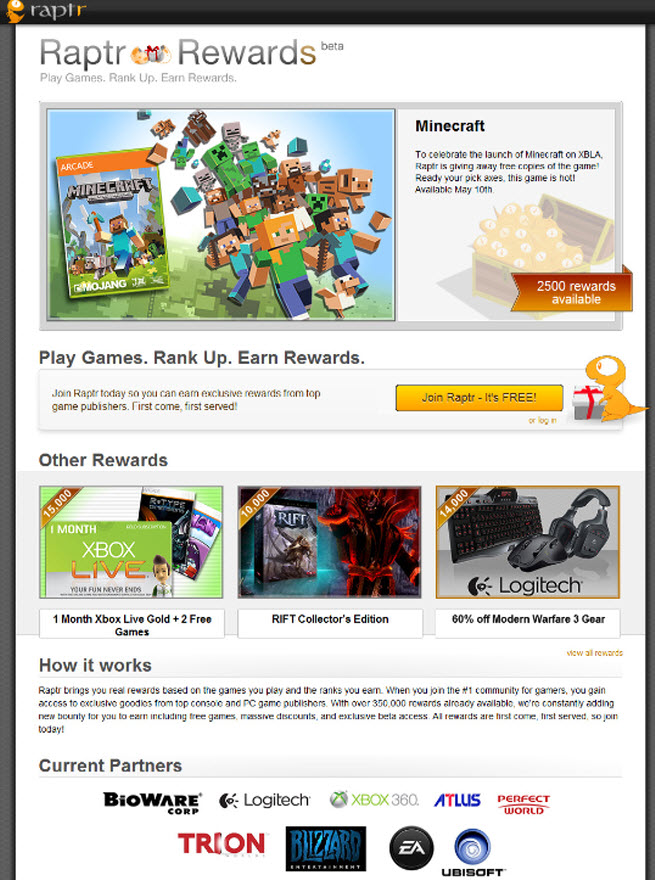Raptr, the gamer social network with 12 million hardcore users, is unveiling a novel rewards program today that gives targeted bonuses to gamers just for playing their favorite titles. Judging by sponsors such as Microsoft and Blizzard jumping on board the program, being a gamer is about to get a lot more awesome.
The Raptr Rewards program has already begun giving away free games, in-game content (such as virtual goods), discounts on merchandise that is relevant to the gamer’s tastes, and a variety of other prizes to people who play games. Raptr knows exactly how much you play because, when you join, it can measure your game playing on platforms such as the Xbox 360, PlayStation 3, and the PC. It anonymizes the data and reports interesting details to game publishers about play habits.
But such data is also very useful for targeting rewards to gamers, said Dennis Fong, chief executive of Mountain View, Calif.-based Raptr, in an interview with GamesBeat. Raptr recently launched a reputation system that ranks players based on the actual data of their play time, which can’t be so easily faked. It then separates gamers on titles such as Battlefield 3 into six categories from Newbie to Elite. Essentially, it sets up a bragging system for gamers that is backed up with data.
Sponsors and advertisers can trust that data as a reflection of a gamer’s real interests. For instance, Raptr cut a deal with Logitech, which sent emails that gave thousands of discounts to players who had reached a certain level of achievement in Call of Duty: Modern Warfare 3. The discount was for 60 percent off of Logitech’s line of Call of Duty accessories. The deal turned out to be so lucrative for Logitech that it released even more discount codes. This kind of deal works much better for the sponsor because it is targeted at someone who is a proven player of a particular kind of game.
“It’s a high-value rewards program,” Fong said. “Gamers can earn rewards simply by playing games and ranking up.”
This could turn out to be a good way to monetize users for Raptr, which hadn’t made any money from its 12 million users. Raptr doesn’t have any subscription fees or advertising on its site. Rather, like Facebook (which shares a common investor, Accel), Raptr is trying to amass a lot of users first. Then it will figure out how to make money from them.
And this rewards program looks very promising in that respect. It fits in with a notion raised by Bing Gordon, a partner at Kleiner Perkins Caufield and Byers: that game companies should actually pay money to people to play games. And it also fits with the broader idea of The Intention Economy, a brand new book by Internet marketing pioneer Doc Searles, who argues that marketers can get a lot more personal in targeting users. Dynamics, a credit-card innovator, also allows merchants to target rewards at consumers.
But unlike Dynamics, Raptr doesn’t require gamers to make a purchase in order to shower them with rewards, Fong said. The system isn’t a sweepstakes, either, where one person among many will win something. Marketers can target many users with rewards in this case. The marketers can also target players with unique goods that are of no value to most people. You could, for instance, give a digital item such as a unique callsign identifier to a Battlefield 3 fan. While it has no monetary value, it has exclusivity.
Fong said that the rewards program is a natural evolution of the service. The gaming reputation system gives players something to be proud of, and in a community of gamers, that amounts to currency.
“There are many different forms of currency in gaming,” Fong said.
Now, like mobile rewards firm Kiip, Raptr can reward players who have good reputations with multiple kinds of currency. That will make users more loyal to Raptr, and it will enable them to get a direct benefit from all of the hours they put into playing. Companies can directly reward players for all of the attention they give the companies’ games. That is a system that can feed on itself.
Raptr Rewards is already live in beta testing, with rewards exceeding $1 million in total value. In May alone, Raptr will offer more than 350,000 new reward items from top partner companies. Players will get redemption codes for free games, downloadable content, beta codes, major discounts, and access to industry events.
Not every player gets a reward. A sponsor may have enough prizes for perhaps the first 1,000 players who redeem a code. That motivates players to try to cash in on their winnings quickly before they expire. The rewards will be directly tied to a player’s rank, the games played, and geographical location.
“It’s on a first come, first serve basis,” Fong said. “But we will be giving away tens of thousands of games. This is a loyalty program that the entire industry can use.”
Fong said that the targeting system is relatively simple to configure for a sponsor, and that Raptr is prepared to scale it up as needed.
Companies that are participating include Atlus (which gave exclusive in-game items and currency), BioWare (which gave free in-game items and collectibles for Mass Effect 3 fans), Blizzard (which gave early access to the Diablo III beta), Gunnar (which gave major discounts for gaming eyewear), Logitech (which gave major discounts of Call of Duty and G Series branded peripherals), Microsoft (which is giving Gold subscriptions for Xbox Live and free Xbox Live Arcade games), Microsoft and Mojang (which are giving something away related to Minecraft in the near future), Perfect World (which gave away free in-game items for Blacklight: Retribution), Trion (which will soon have a giveaway related to Rift), and Ubisoft (which gave away early access to Ghost Recon Future Soldier to 30,000 fans).
Since 2007, Raptr has raised more than $27 million in funding from investors Accel Partners, Founder’s Fund, DAG Ventures, and Tenaya Capital.
VentureBeat's mission is to be a digital town square for technical decision-makers to gain knowledge about transformative enterprise technology and transact. Learn More

